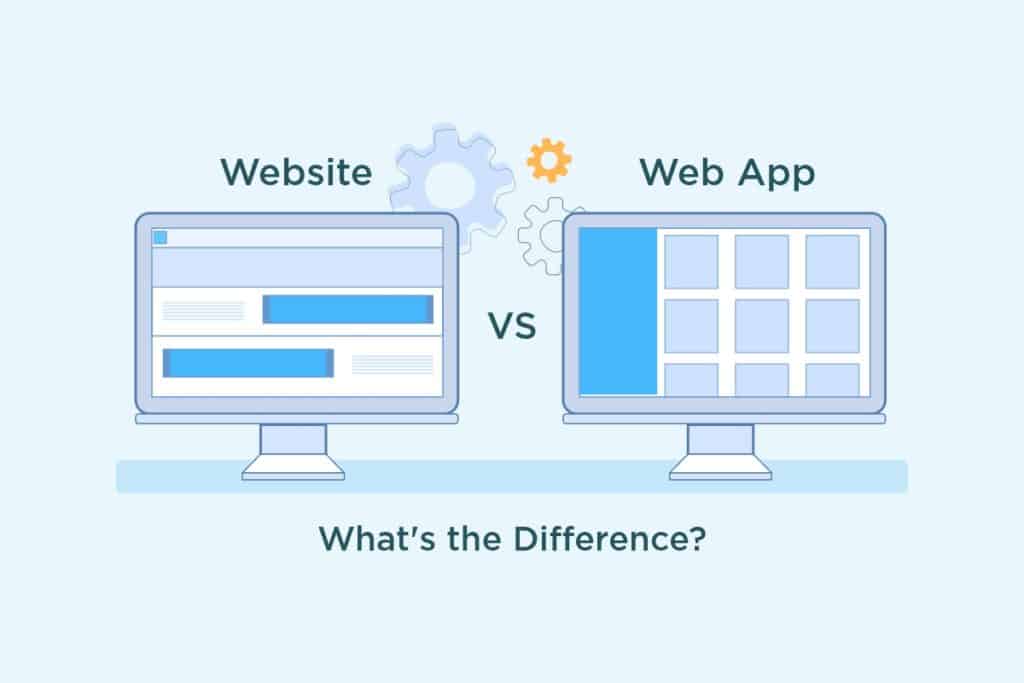Contents
If you’re reading this, you’re probably unfamiliar with the distinction between a website and a web app. And you may be wondering why you should be concerned. However, if you are a business owner or intend to open your web development company in the near future, you should be able to discern the difference to make the most out of your web presence.

Let’s go over both the website and the web app one by one. Let’s start with the website first.
Website:
A website is a collection of globally accessible, interconnected web pages that use the same domain name. It can be created and managed by a single individual, a company or an organisation. The website is meant to serve a variety of functions. Blogs are one such example.
One or more web servers host a website. It is accessible via an IP address over a network such as the Internet or a private local area network. Websites are one-way informational flows; visitors cannot interact or communicate with the site. Mobile websites are designed specifically for tiny touch devices and responsive design websites adjust to the size and kind of browser used to view them.
Need for a Website:
To obtain new consumers, you must first identify where your prospects go when they are looking for suppliers, researching suppliers and making a purchase. In today’s world, the internet, specifically a search engine like Google, Yahoo or Bing, is where most people in most marketplaces go. These three search engines account for more than 90% of all searches. Google is by far the most popular, accounting for almost six out of every ten queries. Hence, to show your presence in the market you should have a well-built website.
The Advantages of having a Website:
- A website improves the user experience on many sorts of mobile devices. Users who own a range of devices may benefit from the compatibility advantages that responsive websites provide.
- Because of the multi-device compatibility provided by flexible web design across multiple platforms, it is becoming easier to reach a larger audience. In terms of the prospective audience, the website wins the “app vs. website” debate.
- Websites are also less expensive to upgrade. You just need to keep one version of them, this allows you to do so swiftly and flexibly.
The Disadvantages of Having a Website:
- A responsive/mobile website cannot take advantage of all smartphone functionalities as effectively. Cameras, GPS, phone dialing and other mobile device functionalities aren’t always appropriate for responsive/mobile websites.
- Because mobile and desktop experiences differ so greatly, using the same interface for both devices may jeopardise your UX This is largely due to the single-window limitation.
- Even if you design your mobile website to be as light and informative as possible, if cached pages are used, it may still work offline with limited functionality only.
Characteristics of a Superb Website:
- The simpler the better when it comes to successful website design! Having too many alternatives on your website might overwhelm users and significantly lengthen the time it takes them to make a decision.
- Pictures convey a lot more information in a much shorter amount of time than massive blocks of text. Images can also be deliberately put in genuinely successful website design to discreetly steer users to where you want them to go.
- People are accustomed to specific generic website styles. Being distinctive is always a wonderful thing, but it may be a better idea to capitalise on what users are already comfortable with!
Web Application:
Mobile applications can be downloaded through portals such as the Google Play Store, App Store or another market depending on the type of operating system. Mobile apps provide faster access to material and more fluid interactions. Several recent statistics indicate the usefulness of mobile apps.
Need of a Web App:
When it comes to specialised business requirements, there are certain circumstances in which developing an application is the ideal solution. Another appropriate moment to select an application is when you’re developing a platform, such as a content marketplace or a social network, that requires access to numerous sorts of content and must maintain all of these elements effectively and actively.
The Advantages of having a Web Application:
- The applications are more popular than identical websites since they are more convenient. Mobile apps improve user experiences, load content faster and are simpler to use.
- Mobile apps are an excellent alternative for services that must be used frequently. Users can utilise an application to configure preferences, create personal accounts and store important information close at hand.
- Another significant advantage of mobile apps is the ability to use them while not connected to the internet. When apps are installed on a mobile device, they can continue to provide access to content and features even when the device is not connected to the internet.
The Disadvantages of having a Web Application:
- A mobile application must meet the criteria of the operating system to run properly. This means that each platform – iOS, Android, and Windows – necessitates its own app version.
- Supporting an application that has been developed for many platforms costs extra effort and money. Indeed, you must deliver upgrades and resolve compatibility issues for all types of devices frequently.
Characteristics of a Superb Web Application:
- The most successful apps are those that identify and address an issue, whether it’s chatting with overseas relatives or checking in for a flight, such as American Airlines.
- A successful app keeps users interested.
- A successful app must always reply promptly to user input or at the very least notify the user that the app is waiting.
What Is the Distinction Between a Website and a Web Application?
There are numerous significant changes that you should be aware of:
- Interactivity: A website, for the most part, does not require much user engagement. There is usually a basic minimum, such as a comment section and a contact form, but that is about it. Web apps, on the other hand, are designed expressly to allow the user/customer to interact with the product.
- Integration: Web apps are so extensive because of their integration. You might need to hire dedicated web developers to enable users to complete various tasks while also enjoying the available content.
Websites may also necessitate some form of integration, but this is usually modest and always optional. Without third-party connectivity, a website can be entirely functional and valuable.
- Authentication: For security concerns, web apps cannot work without user authentication. Most apps contain some level of sensitive information and personal data. It may contain information such as a person’s name, date of birth, address, credit cards/PayPal, other financial information, a phone number, and so on.
Websites, on the other hand, may use authentication to provide more information or functionality to visitors (like an ability to rate the content or leave comments once logged in). However, it is not required, and this step can easily be avoided.
Conclusion:
You can hire dedicated web developers to build a stunning modern website that is ideal for brands looking to build a name for themselves and make a statement. However, it’s a terrific method to get future clients acquainted with your company. If you want to offer things or services directly online or if you want to construct a feature-rich platform and monetise it, a web app is the way to go.
Finally, it is up to you to decide which option to pursue and which path to go with your company’s web presence. You can reach out to a well-recognised web development company to help you make the best decision. We simply hope that this post may take some of the weight off your shoulders and be of some assistance to you on your business path.



